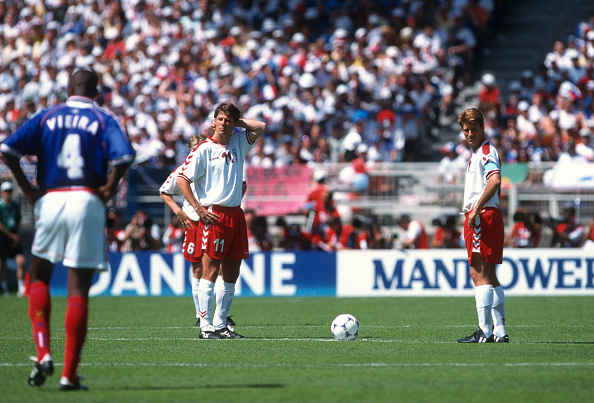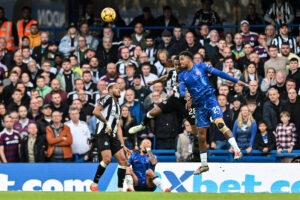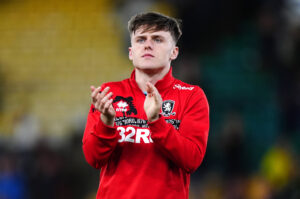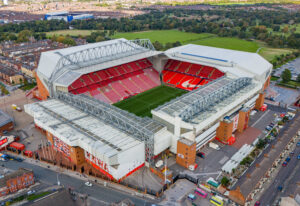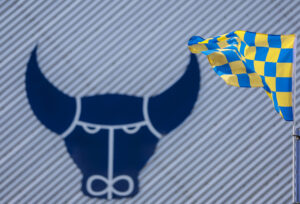Welcome to Last Word on Football’s ‘Families in Football’ series. Over the next few weeks, we take a look at siblings, cousins, and even parents and children that have played the beautiful game. Some have played cup finals together while others have been on opposing sides. Today we look at Michael and Brian Laudrup, arguably the most talented brothers in football history.
Families in Football: Michael and Brian Laudrup
Michael Laudrup
Voted the greatest ever Danish footballer in 2006, Michael Laudrup’s career began in his homeland, very early being earmarked as a superstar in waiting.
His first-team debut came with KB in 1981 at the age of 16 before a return to Brondby the following season. He replaced his father, Finn, in the lineup, who had retired at the end of the prior campaign.
Quickly, Michael became the best player in the country, scoring 24 goals in two seasons and landing his first of two Danish Player of the Year awards in 1982 – the youngest in history at just 18 years of age. He later won a second in 1985.
His performances inevitably caught the eye of Europe’s biggest clubs. A move to Liverpool was cancelled at the last minute, meaning Michael instead linked up with Italian giants Juventus in 1983.
At the time, restrictions on the number of foreign players allowed in matchday squads were imposed in most leagues. Upon arrival in Turin, there was already two established non-Italian stars in the Old Lady’s ranks, namely French maestro Michel Platini. As a result, Laudrup spent two years on loan with fellow Serie A side Lazio.
Despite scoring twice on his debut, the Dane joined the Biancoclesti in a darker period of their history. Relegation came in his second and last season in the capital.
Laudrup returned to reigning European Champions Juventus in 1985, replacing Polish midfielder Zbigniew Boniek as a foreign player and linking up with the now three-time Ballon d’Or winner Platini.
Working under Giovanni Trappatoni, the two dovetailed to great effect, landing the league title in 1985/86 – the first of seven in Laudrup’s career.
Trappatoni and Platini departed in back to back summers, leaving Laudrup to take centre stage at a club in transition. He, and new signing Ian Rush, struggled and no further trophies came by the time he left for pastures new in 1989.
At odds with the defensive Serie A, Laudrup found his spiritual home in Barcelona under the tutelage of his idol Johan Cruyff.
A player born to play “Total Football”, he thrived in the so-called ‘dream team’ and was integral in the Catalan’s four-in-a-row league dominance (1990/91 to 1993/94) and capture of the club’s first European Cup in 1992.
However, once again those pesky foreign restrictions got in the way, as Cruyff was made to pick three from a brilliant four of Laudrup, Romario, Ronald Koeman and Hristo Stoichkov.
This led to the Dane departing the Nou Camp in 1994, much to the disappointment of Los Cules’ fans.
Shockingly he crossed the El Clasico divide and signed for Real Madrid, a team Laudrup had regularly tormented in past years including a 5-0 thumping in his final season at Barca.
The upper hand in the rivalry moved with Laudrup as La Liga went to the Bernabeu in 1994/95. His impact was crystallised by a reversal of that 5-0 scoreline in favour of Los Blancos.
His time at Real also saw the emergence of Raul as the successor to his throne – Laudrup assisted the Spaniard’s first senior goal, before handing over the keys to the kingdom.
He remains arguably the only player to have hero status on both sides of the rivalry.
Leaving Spain in 1996, Laudrup spent 18 months sipping sake in Japan with Vissel Kobe before a fitting swansong with Ajax in the 1997/98 season, bowing out with a Dutch league and cup double.
At international level Laudrup was the star player of a golden age in Danish football, making his debut in 1982 on his 18th birthday. Across 16 years, he made 104 appearances, 28 of which he was captain for, scoring 37 goals.
He appeared at three European Championships and three World Cups, starring in 1986 and retiring from the game as captain after a quarter-final exit in 1998.
Brian Laudrup
For most players, the shadow of a brilliant older brother would be too much to overcome, but not Brian Laudrup.
Like his father and brother, he played for Brondby in the 1980s, making his debut in 1986 aged 17.
Alongside fellow future Danish icon Peter Schmeichel, Brian starred in back-to-back league title successes in 1987 and 1988. His four seasons at Brondby coincided with the first of four Danish Player of the Year awards in 1988.
Laudrup left Denmark for Germany in 1989, first spending a season with Bayer Uerdingen, a now-relic of the Bundesliga era.
He instantly impressed, catching the attention of Bayern Munich who paid, at the time, a record league transfer fee to bring the Dane to Bavaria.
His two seasons with the German giants saw contrasting fortunes for both himself and the club.
In 1990/91, he was instrumental in Bayern’s push to the European Cup semi-finals, becoming hugely popular across the country in the process – extremely rare for any Bayern player.
The 1991/92 campaign was marred by a knee injury and he sat in the stands as Bayern descended into chaos, finishing in a lowly tenth position.
As was the norm at the time, Laudrup saw Italy as his calling and signed for Fiorentina in advance of the 1992/93 season. He joined stars such as Gabriel Batistuta, Stefan Effenberg and Dunga.
The Viola couldn’t stay up and suffered a shock relegation, bringing an end to Laudrup’s time in Florence.
He moved north to Fabio Capello’s all-conquering AC Milan on loan but struggled to break into the side. Like his brother, Brian fell afoul of restrictions on foreign players, meaning he played just nine league games all season.
At a crossroads in his club career, Laudrup was offered an escape route by Walter Smith’s free-spending Rangers. In what he described as the “four best years of his career”, the Dane won multiple team and individual honours and played alongside fellow genius Paul Gascoigne.
Three league titles came as Rangers equalled Celtic’s nine-in-a-row, accompanied by both domestic cups – Laudrup provided two goals and three assists in the Scottish Cup final triumph in 1996.
Two Scottish Player of the Year awards were recognition of his status as the best player in the league.
After departing Glasgow, Laudrup experienced an unhappy 1998/99 season. He signed for newly cosmopolitan Chelsea and their foreign legion of stars (restrictions were lifted in 1995), but soon fell out with the club hierarchy and returned to his homeland with Copenhagen. His Brondby connections were never forgotten, and again he quickly left.
Laudrup’s final season was spent at Ajax where he was forced to retire in the summer of 2000 due to injuries, aged just 31.
At international level, Laudrup won 82 caps and scored 21 goals, competing at two Euros and one World Cup, retiring from duty in 1998.
Games Played Together and Against
Michael and Brian Laudrup played together 44 times for Denmark, normally as the team’s two best players. They both retired after a 3-2 loss to Brazil in the 1998 World Cup.
Their careers are more famous for the games they didn’t play together or against one another, both at international and club level.
Both brothers had quit the national team in 1990 due to grievances with the manager, but Brian returned for the Danes’ 1992 Euro success. Michael did not, meaning the greatest player in the country’s history missed out on their greatest day.
At club level, the Michael and Brian Laudrup were both in the stands for the 1994 European Cup final as Brian’s AC Milan beat Michael’s Barcelona 4-0. Foreign restrictions again to blame.
Interesting Facts
Alongside father Finn, the Laudrups are the most capped international family ever with a combined 205 caps.
Their uncle, Ebbe Skovdahl, was a legendary Brondby manager, coaching Brian and against Manchester United in the 1998/99 Champions League group stages.
Michael and Brian Laudrup won a combined six Danish Player of the Year Awards.
While never playing together at club level, both brothers played for Brondby in their younger years and retired at Ajax.
Both brothers won and were relegated from Serie A.
Michael was voted the best foreign La Liga player of the last 25 years in 1999.
Michael also forged a relatively successful management career, the highlight being a League Cup triumph with Swansea City in 2013.
Main Photo


